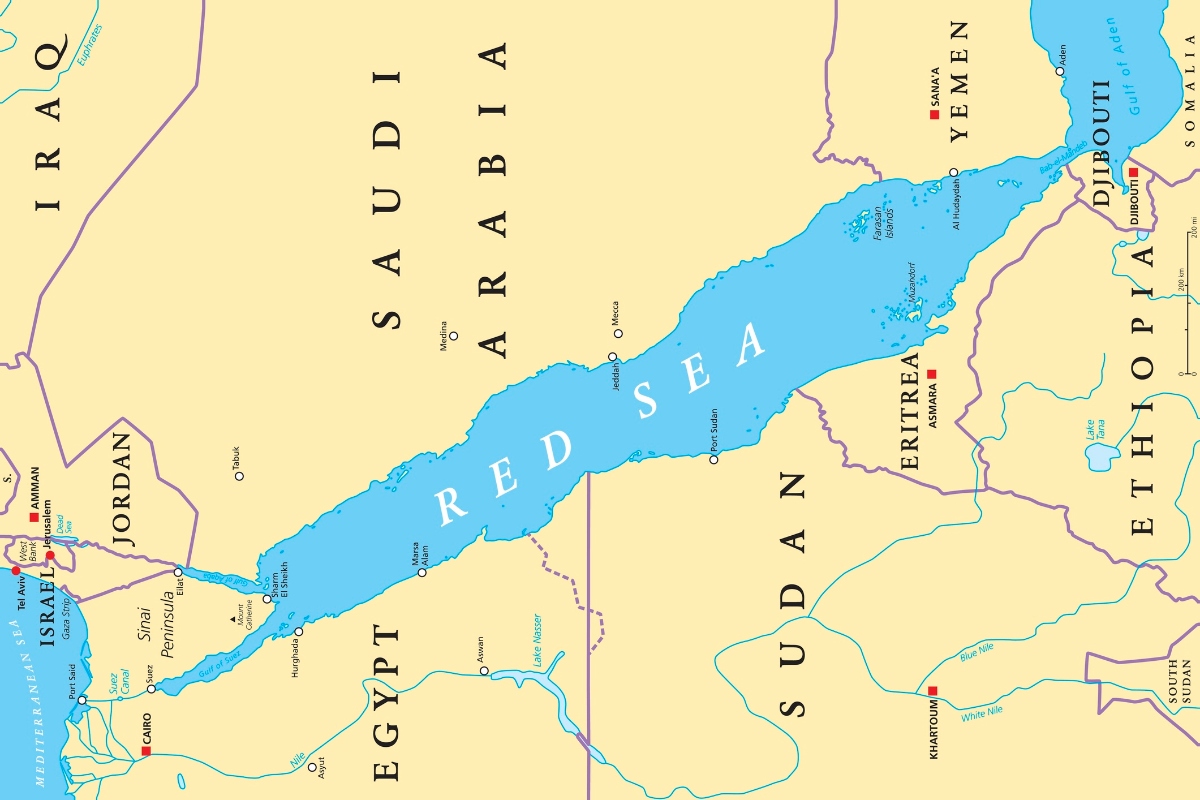At night, when the Israelites were blocked in by the Red Sea and the attacking Egyptians, God parted the Red Sea (Exodus 14:10-21). All the people of Israel, along with their livestock, were able to cross on dry land with towering walls of water on the right and left as Moses led them (Exodus 14:21-22; Psalm 78:13).
Even though the Egyptians tried to chase after the Israelites by crossing through the sea, God enclosed the waters around them, which caused Israel’s oppressors to drown (Exodus 14:27-28). On that day, the Lord displayed His power and might through the miraculous parting of the Red Sea.
Parting of the Red Sea: Table of Contents
Crossing the Red Sea Summary
The Crossing of the Red Sea was a pivotal moment of trust in the Lord along the momentous journey of the Israelites, led by Moses, as they flee from centuries of slavery under the Egyptian Pharaoh. Following the ten plagues that devastated Egypt, Pharaoh finally consented to release the Israelites. However, soon after their departure, Pharaoh changes his mind and he commands his army to pursue the fleeing slaves, cornering them against the Red Sea.
As the Egyptian army closes in, the Israelites, trapped and fearing for their lives, express their despair. Moses, following instructions from the Lord, demonstrates unwavering faith and leadership. He stretches out his staff over the waters of the Red Sea, invoking a miracle. The sea parts, creating a dry path through its depths, bordered by towering walls of water on either side. This miraculous path provides the Israelites a means of escape, symbolizing a gateway from slavery to freedom.
The Israelites hurriedly make their way across, with the Egyptian forces following closely behind. Once the last of the Israelites reaches the safety of the opposite shore, the precarious balance of the parted sea is withdrawn. Again, following God's command, Moses stretches out his hand over the sea, triggering the waters to collapse back into their place. The returning waters engulf the Egyptian army, effectively halting their pursuit and ensuring the safety of the Israelite people.
Parting of the Red Sea Bible Verses
Exodus 14:21-31 (NIV)
Then Moses stretched out his hand over the sea, and all that night the Lord drove the sea back with a strong east wind and turned it into dry land. The waters were divided, and the Israelites went through the sea on dry ground, with a wall of water on their right and on their left.
The Egyptians pursued them, and all Pharaoh’s horses and chariots and horsemen followed them into the sea. During the last watch of the night the Lord looked down from the pillar of fire and cloud at the Egyptian army and threw it into confusion. He jammed[a] the wheels of their chariots so that they had difficulty driving. And the Egyptians said, “Let’s get away from the Israelites! The Lord is fighting for them against Egypt.”
Then the Lord said to Moses, “Stretch out your hand over the sea so that the waters may flow back over the Egyptians and their chariots and horsemen.” Moses stretched out his hand over the sea, and at daybreak the sea went back to its place. The Egyptians were fleeing toward[b] it, and the Lord swept them into the sea. The water flowed back and covered the chariots and horsemen—the entire army of Pharaoh that had followed the Israelites into the sea. Not one of them survived.
But the Israelites went through the sea on dry ground, with a wall of water on their right and on their left. That day the Lord saved Israel from the hands of the Egyptians, and Israel saw the Egyptians lying dead on the shore. And when the Israelites saw the mighty hand of the Lord displayed against the Egyptians, the people feared the Lord and put their trust in him and in Moses his servant.
Significance of Parting the Red Sea
1. An Act of Salvation in Freeing the Israelites
The parting of the Red Sea is one of the most significant events in the Old Testament. It is repeatedly mentioned to emphasize God’s amazing act of salvation in freeing the Israelites from slavery.
For 400 years, the Israelites had been enslaved and mistreated in Egypt (Acts 7:6). God had previously told Abraham: “know for certain that for four hundred years your descendants will be strangers in a country not their own and that they will be enslaved and mistreated there” (Genesis 15:13).
However, He also promised to punish Egypt and bring out Israel with an abundance of possessions (Genesis 15:14).
When the Lord heard the cries of His people, He responded by sending Moses and Aaron to the Israelites (Exodus 2:24; Exodus 3:9-10; 4:29). Through them, He pronounced judgment on Pharaoh and sent ten plagues against Egypt to show that He alone is God (Exodus 7-12; 7:5).
After the plague of the death of the firstborn son, Pharaoh allowed the Israelites to leave but then changed his mind (Exodus 12:31; 14:5). He chased after them until Israel was hemmed in by the sea. God used this situation to display His power in parting the Red Sea.
On that day, God set Israel free. They were no longer slaves to Egypt. In response to God’s act of salvation, the Israelites sang to God a song of praise: “I will sing to the Lord, for he is highly exalted. Both horse and driver he has hurled into the sea” (Exodus 15:1).
Repeatedly in Israel’s years of wandering and entrance into the Promised Land, God would remind them of His miraculous act of freeing them from slavery (Exodus 20:2; Deuteronomy 5:6).
2. A Display of God’s Power over Nature
Another reason the parting of the Red Sea is significant is that it displays God’s power over nature. The Israelites crossing through the sea on dry land was a miracle by the Lord.
This is a crucial point because many scholars and commentators attempt to explain the parting of the Red Sea as a natural phenomenon.
Some commentators have argued that the Red Sea mentioned in Exodus 14 refers to a reedy marsh and that the Israelites crossed through the low waters.
Other scholars have posited that a volcanic eruption caused a tidal wave to part the Red Sea. These explanations, though, dismiss the biblical account.
The Israelites did not merely wade through a shallow river. They recorded that they passed through on dry ground (Exodus 14:29; Hebrews 11:29).
God was the cause of the parting of the Red Sea when he sent a strong wind to push back the waters (Exodus 14:21-22). He is the Creator and has power over His creation to control the wind and sea (Psalm 89:9; Mark 4:39).
While it is popular for people to explain away biblical miracles with naturalistic explanations, Christians should listen to God’s Word. The parting of the Red Sea was a miracle from God and a wonderful display of His power.
3. A Reminder of God’s Faithfulness
In the rest of the Old Testament, we see followers of God looking back to the parting of the Red Sea to remind themselves of God’s faithfulness. When Joshua led the Israelites into the Promised Land, God parted the Jordan River to lead them into their new home (Joshua 3:17).
He did this to remind the Israelites of what He did in parting the Red Sea and freeing them from slavery.
As it is recorded in the Book of Joshua, “For the LORD your God dried up the Jordan before you until you had crossed over. The LORD your God did to the Jordan what he had done to the Red Sea when he dried it up before us until we had crossed over” (Joshua 4:23).
In Psalm 74, there is another reminder of God’s faithfulness connected to the parting of the Red Sea. Asaph talks about the enemy who ransacked God’s sanctuary (Psalm 74:4-7). Worrying about Israel’s enemy, Asaph asks if God would reject His people forever (Psalm 74:1).
In reply to his own question, Asaph reminds himself and others of God’s past deeds of faithfulness. As he wrote, “But God is my King from long ago; he brings salvation on the earth. It was you who split open the sea by your power;” (Psalm 74:12-13).
Although he goes on to describe the Lord’s power over creation (Psalm 74:16-17), Asaph specifically mentions the parting of the Red Sea to remind himself of God’s salvation. The Lord had saved them before from the enemy and He would do it again.
Where Is the Red Sea Located?

In the Bible, the Red Sea is located between Egypt and the Arabian Peninsula, serving as a natural boundary to the south of ancient Egypt. The term "Red Sea" in biblical times refers not only to the body of water known today as the Red Sea but also, according to some interpretations, could include other nearby bodies of water such as the Gulf of Suez and the Gulf of Aqaba, extensions of the Red Sea. The exact location of the crossing has been the subject of various theories and interpretations over the years, but traditionally, it is understood to be somewhere along the boundary between Egypt and the Sinai Peninsula, allowing the Israelites to escape Pharaoh's army and continue their journey towards Canaan.
Evidence of the Parting of the Red Sea
Despite numerous expeditions and studies, conclusive archaeological evidence of the crossing as described in Exodus has not been found. Several factors contribute to the difficulty in locating such evidence, including the natural changes in landscapes over thousands of years, the challenges of underwater archaeology, and the symbolic interpretation of biblical texts.
There have been claims of discovering chariot wheels and other artifacts in the Red Sea that purportedly date to the time of the Exodus. However, these claims have not been substantiated by mainstream archaeology. The search for physical evidence of the Red Sea crossing is complicated by the lack of specific details in the Bible about the crossing's exact location and the passage of time.
For further reading:
Why Did Moses Remove His Shoes in Front of the Burning Bush?
Photo Credit: ©iStock/Getty Images Plus/rudall30
Map: Getty/PeterHermesFurian




.jpg)

